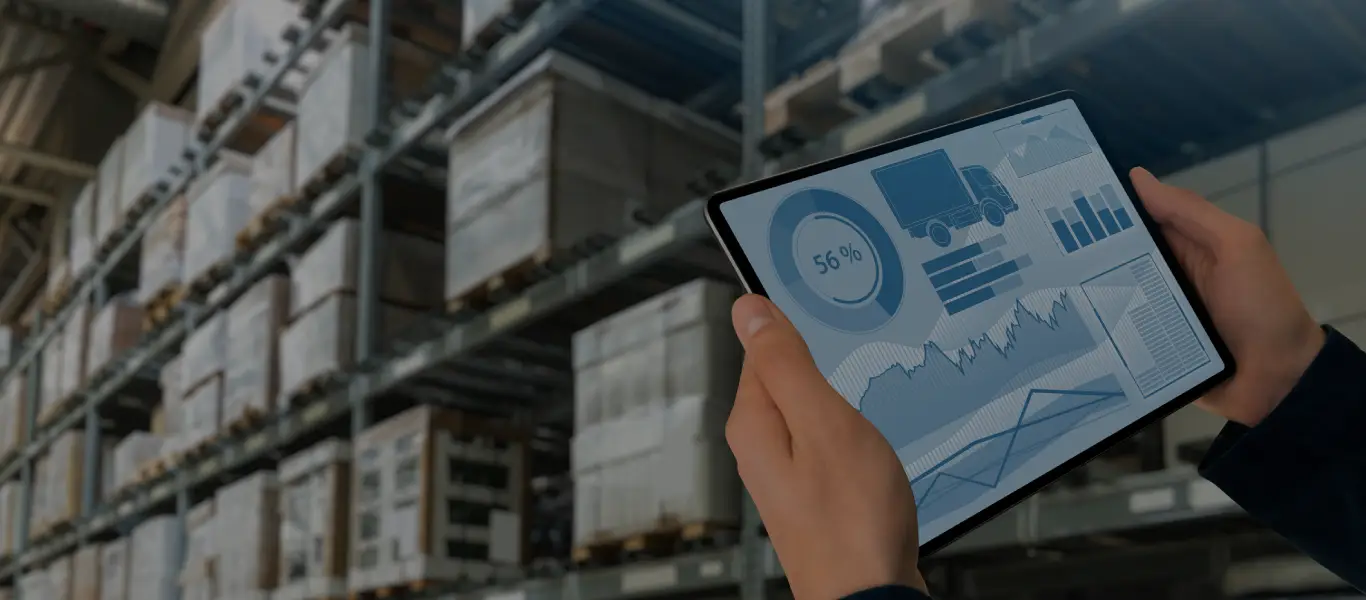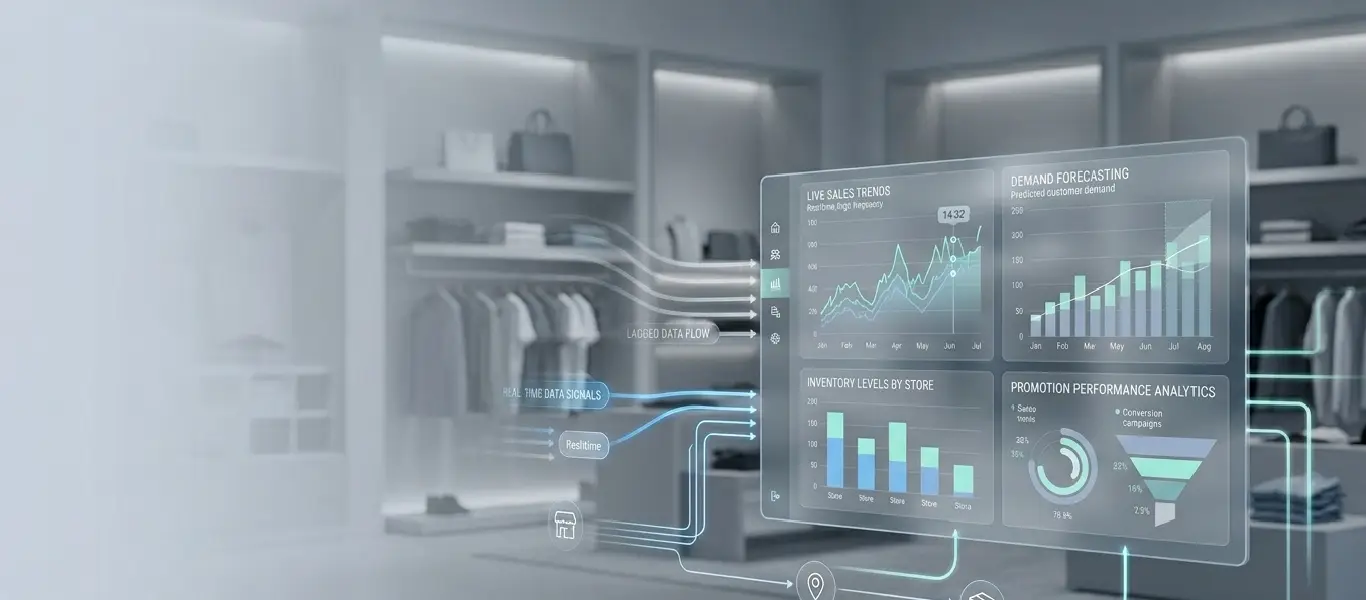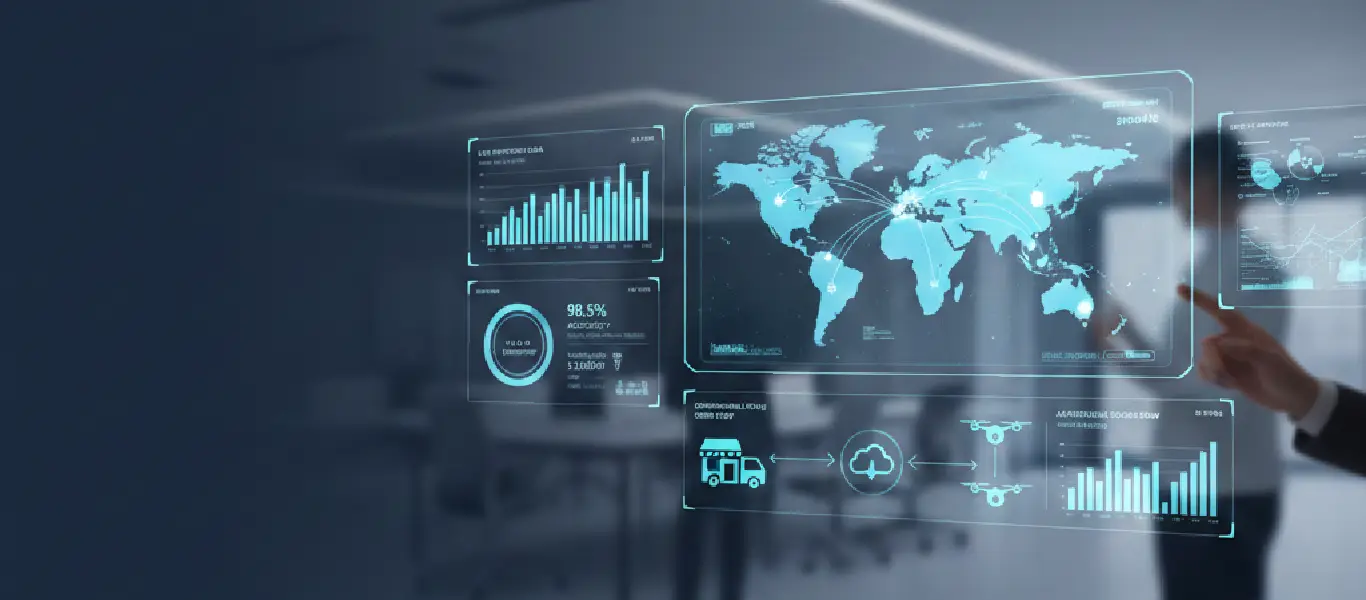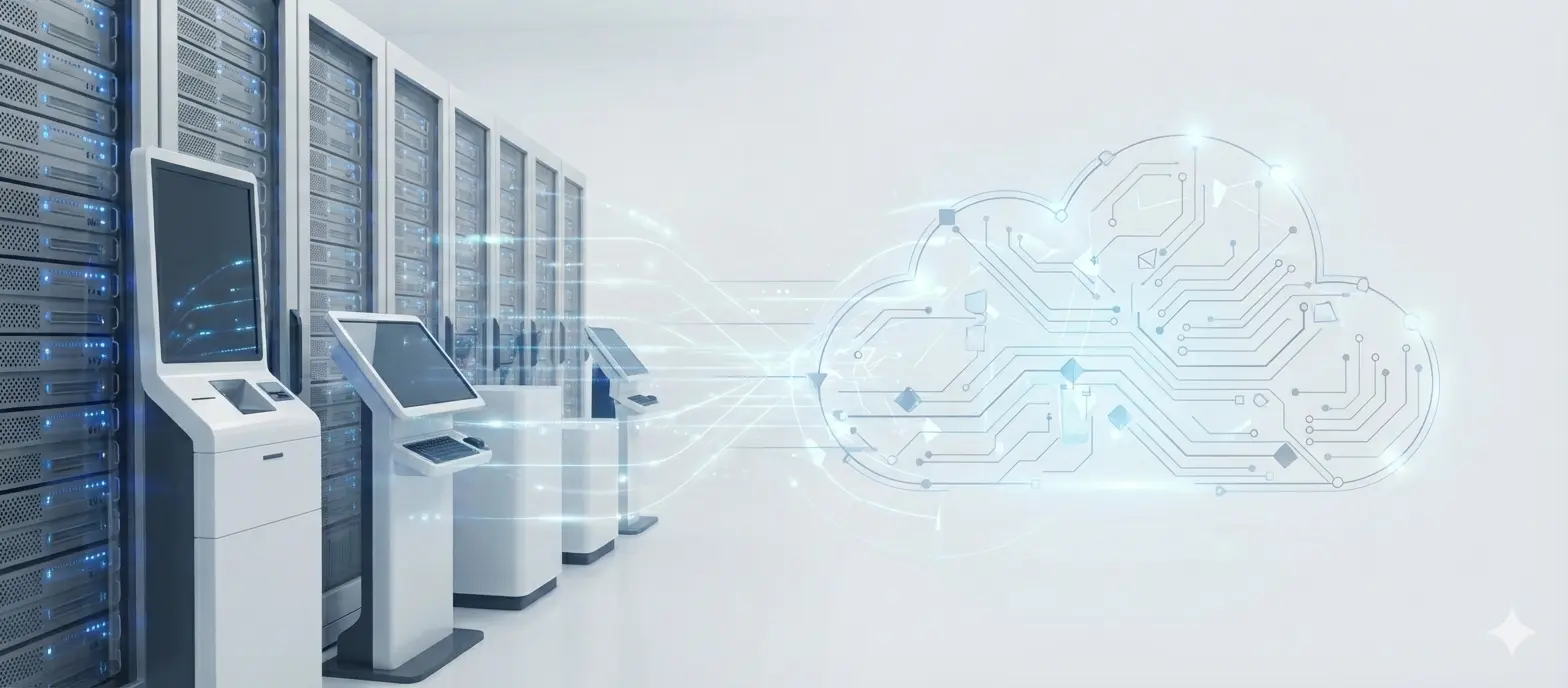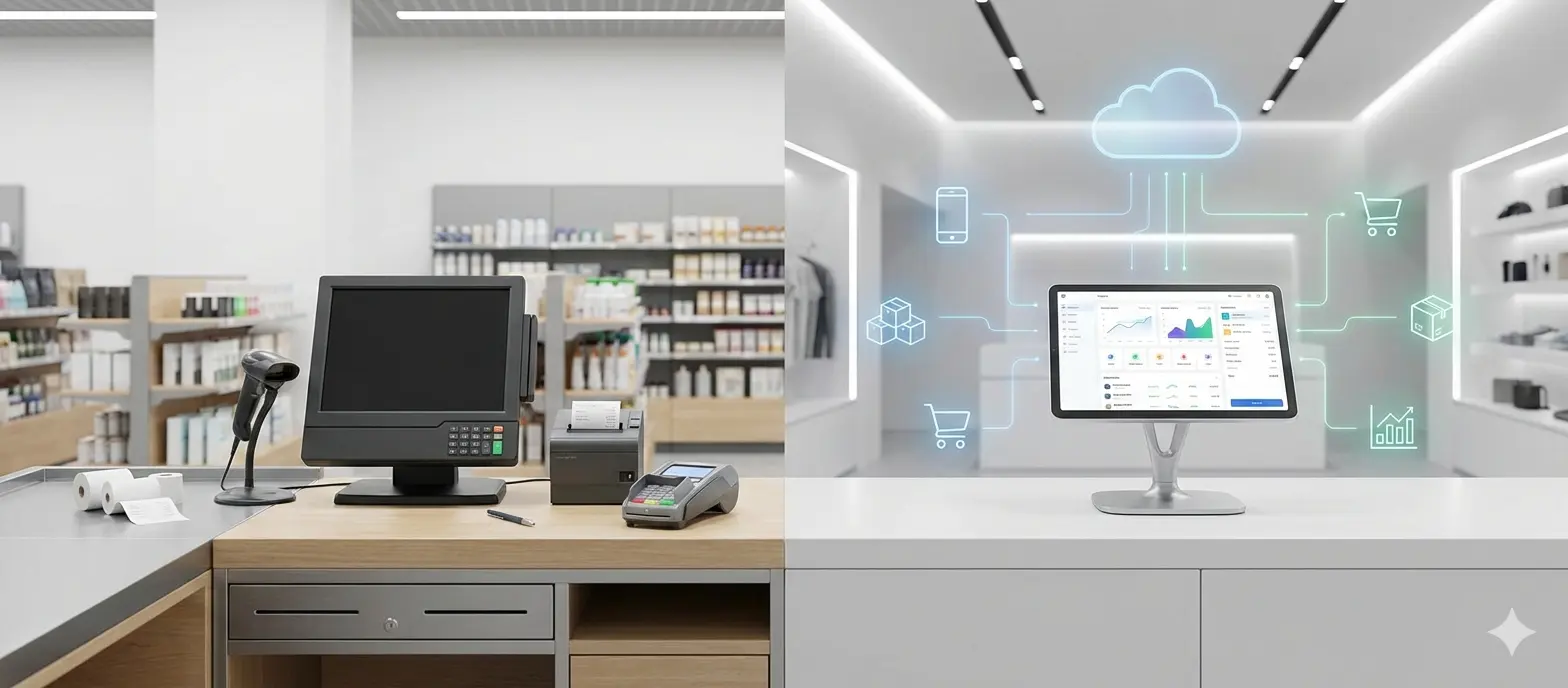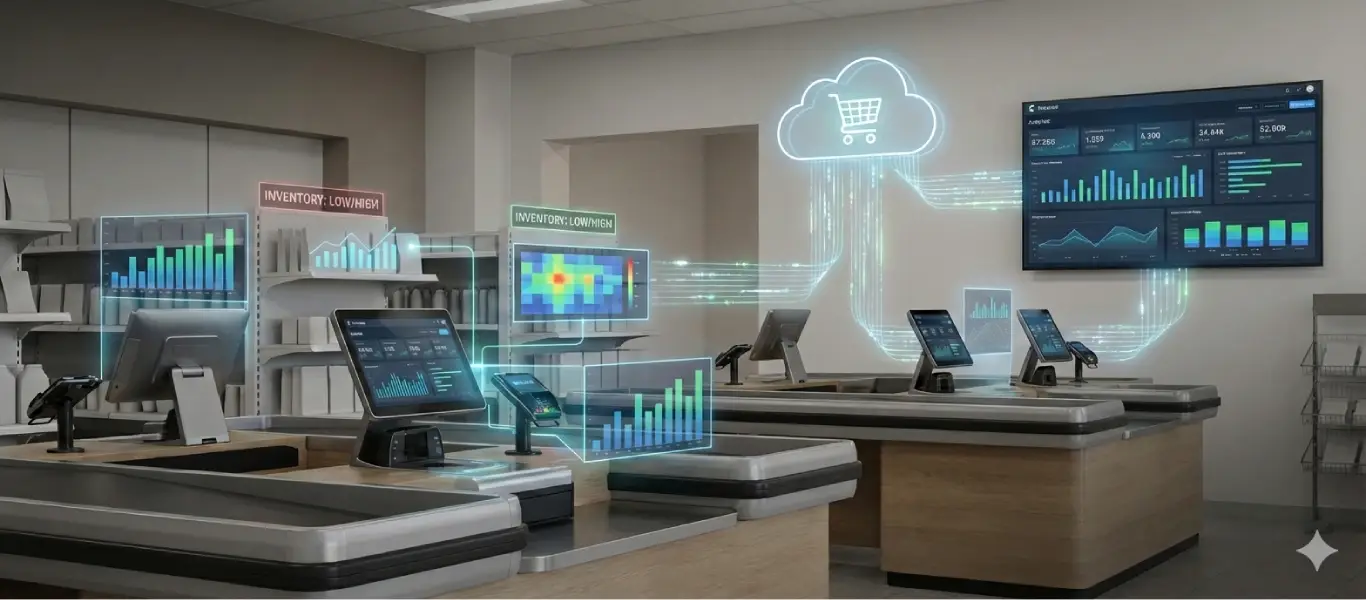In today’s fast-moving retail world, siloed systems lead to costly delays, missed opportunities, and inconsistent customer experiences. As retailers strive to unify their operations across online and offline channels, integration has become the foundation for operational excellence.
At the center of this transformation is the Oracle Retail Merchandising Cloud Services (RMCS). RMCS is a cloud-native solution that powers inventory, pricing, purchasing, and financial workflows. When ORMCS (or its on-prem predecessor RMS) is seamlessly integrated with Point-of-Sale (POS) and Enterprise Resource Planning (ERP) systems, retailers unlock the real-time data flow required for agility, accuracy, and scalability.
This guide explores how ORMCS integrates with POS and ERP systems, the business value of doing so, common integration challenges, and how SkillNet Solutions leads the way in delivering unified Oracle Retail environments.
What is Oracle Merchandising Cloud Service?
Oracle RMS has long been the centralized nervous system of a retail enterprise. With the transition to Oracle Retail Merchandising Cloud Services (ORMCS), retailers gain all the core merchandising capabilities, such as vendor onboarding, purchase orders, inventory management, pricing, and invoice reconciliation, but with the added agility and scalability of a SaaS platform.
Benefits of ORMCS over RMS include:
- SaaS agility: Always current with Oracle-managed updates.
- Lower technical debt: Reduced infrastructure overhead.
- API-first integrations: Faster, more scalable connectivity with POS and ERP.
- Future readiness: A platform aligned with cloud-native architectures.
Legacy RMS used RTLogs, batch jobs, and middleware. In ORMCS, these integrations are modernized via APIs and Oracle Retail Integration Cloud Services (RICS).
With real-time visibility into product movement, promotions, and procurement, Oracle Merchandising, whether RMS or cloud-native ORMCS, empowers retailers to make faster, smarter decisions. It serves as the single source of truth for product and financial data across all channels.
Why Seamless ORMCS Integration with POS & ERP Drives Retail Efficiency
In today’s dynamic retail environment, integrating Oracle Retail Merchandising Cloud Services (ORMCS) with systems like Oracle Xstore POS and enterprise ERPs isn’t just a best practice. It’s a business imperative. Seamless integration ensures accurate, consistent data flow across the entire retail value chain, empowering teams to respond faster and operate more efficiently.
Here’s how integrated systems deliver measurable impact:
- Real-Time Inventory Synchronization: Maintain accurate stock visibility across channels by syncing inventory movements between POS and ORMCS. Thereby reducing stockouts, overselling, and customer dissatisfaction.
- Unified Product Data: Ensure consistency in item details, pricing, and promotions across all customer touchpoints, from store to online to mobile, thereby enabling a smooth and trustworthy shopping experience.
- Improved Financial Accuracy: Align merchandising activities with ERP systems to streamline forecasting, reconciliation, and reporting, improving control and reducing manual errors.
- Support Omnichannel Journeys: Enable BOPIS (Buy Online, Pick Up In Store), endless aisle, gift card redemptions, and hassle-free returns through seamless backend coordination.
When done right, ORMCS integration becomes a powerful enabler of agility, scalability, and customer-centric retail operations.
Core Components of the Oracle Retail Ecosystem
Effective integration begins with a clear understanding of the key systems that make up the Oracle Retail suite. Each solution plays a distinct role in supporting end-to-end retail operations. Here are the core components relevant to integration:
- Oracle Retail Xstore POS: A modern, cloud-enabled POS system that supports mobile checkout, clienteling, and real-time inventory visibility. It acts as the frontline system for in-store customer engagement and transaction capture.
- Oracle Retail Sales Audit (ReSA): Ensures transactional integrity by validating and auditing sales data from POS systems before it flows into downstream merchandising and financial systems. ReSA helps identify anomalies and maintain clean, reliable data.
- Oracle Retail Invoice Matching (ReIM): Automates the matching of invoices, receipts, and purchase orders for better payment accuracy.
- Retail Financial Integration (RFI): Bridges Oracle RMCS with ERP platforms, enabling consistent financial data exchange.
Together, these systems form the operational backbone of a unified Oracle Retail environment. Seamless integration across them is essential for data accuracy, financial transparency, and operational agility.
Integration Architecture: How It All Connects
Data Flow from POS to ORMCS
- RTLog Generation: Xstore POS captures transactions and creates RTLog files (Retail Transaction Logs).
- Data Transport: Middleware transports these logs to ReSA.
- Validation: ReSA checks transaction accuracy before updating ORMCS.
- Inventory Update: ORMCS reflects real-time sales data, ensuring accurate inventory and pricing.
Data Flow from ORMCS to ERP
- Financial Data Export: ORMCS pushes cost, margin, and purchase data into ERP via RFI.
- Invoice Matching: ReIM integrates with ERP to confirm invoice details with ORMS records.
- Reporting: ERP consolidates this data for accurate financial and tax reporting.
Integration Methods and Tools
File-Based Integration
- RTLog Files: Used for POS-to-ReSA data flow.
- Batch Jobs: Scheduled imports and exports manage large data sets efficiently.
Web Services & APIs
- Real-Time Integration: APIs allow for live data exchange, enabling responsive operations.
SkillNet Accelerators for Successful Integration
SkillNet leverages a suite of proprietary accelerators to help retailers integrate Oracle Retail solutions efficiently, reliably, and at scale. These tools are purpose-built to reduce complexity, automate key processes, and support faster time to value.
StoreHub Integration Platform
SkillNet’s StoreHub simplifies and streamlines connectivity across the Oracle Retail ecosystem.
- Prebuilt Connectors: Accelerates integration with Oracle and third-party systems.
- Legacy Migration Support: Enables smooth transitions from legacy store systems to cloud-based Oracle Retail solutions, reducing complexity and risk.
Commerce DevOps Accelerator
SkillNet’s DevOps Accelerator enhances integration delivery through automation and governance.
- CI/CD and Test Automation: Enables continuous integration, automated testing, and standardized deployments across development, QA, and production environments.
- Faster, Safer Rollouts: Reduces manual effort, increases release velocity, and ensures integration quality through version-controlled, repeatable delivery pipelines.
Together, these accelerators provide a foundation for seamless integration and sustained operational agility across Oracle Retail implementations..
Best Practices for Seamless Integration
With over two decades of experience in Oracle Retail implementations, SkillNet specializes in designing and delivering complex, scalable integrations tailored to retailers’ unique environments.
- Data Mapping: Ensure field-level consistency between POS, ORMCS, and ERP systems.
- Error Handling: Build error detection and correction logic for resilience.
- Monitoring: Set up alerts for integration failures or bottlenecks.
- Thorough Testing: Validate both real-time and batch data transfers in sandbox environments.
SkillNet’s Integration Approach
With over two decades of experience in Oracle Retail implementations, SkillNet specializes in designing and delivering complex, scalable integrations tailored to retailers’ unique environments.
Why SkillNet?
Proven Success: “SkillNet successfully took a national retailer live with Oracle Xstore POS integrated with RMS, payments, and a custom-built weight scale for bulk produce—delivering real-time inventory sync and a faster checkout experience.”
Common Challenges (and Solutions)
| Challenge | SkillNet’s Solution |
|---|---|
| Data inconsistencies | Validation scripts and reconciliation reports |
| Downtime during migration | Phased cutovers and fallback options |
| Scalability issues | Design API-first architecture with caching |
| Compliance concerns | Ensure PCI-DSS, SOC2, and GDPR compliance |
Future Trends in ORMCS Integration
As retail technology evolves, Oracle RMCS integration is expanding beyond traditional boundaries. Here are key trends shaping the future:
- Cloud-Native Retail: Migration to Oracle Retail Cloud for agility and lower maintenance.
- AI/ML Integration: Predictive pricing and inventory via machine learning models.
- Blockchain in ERP: Transparent, tamper-proof audit trails for procurement and vendor payments.
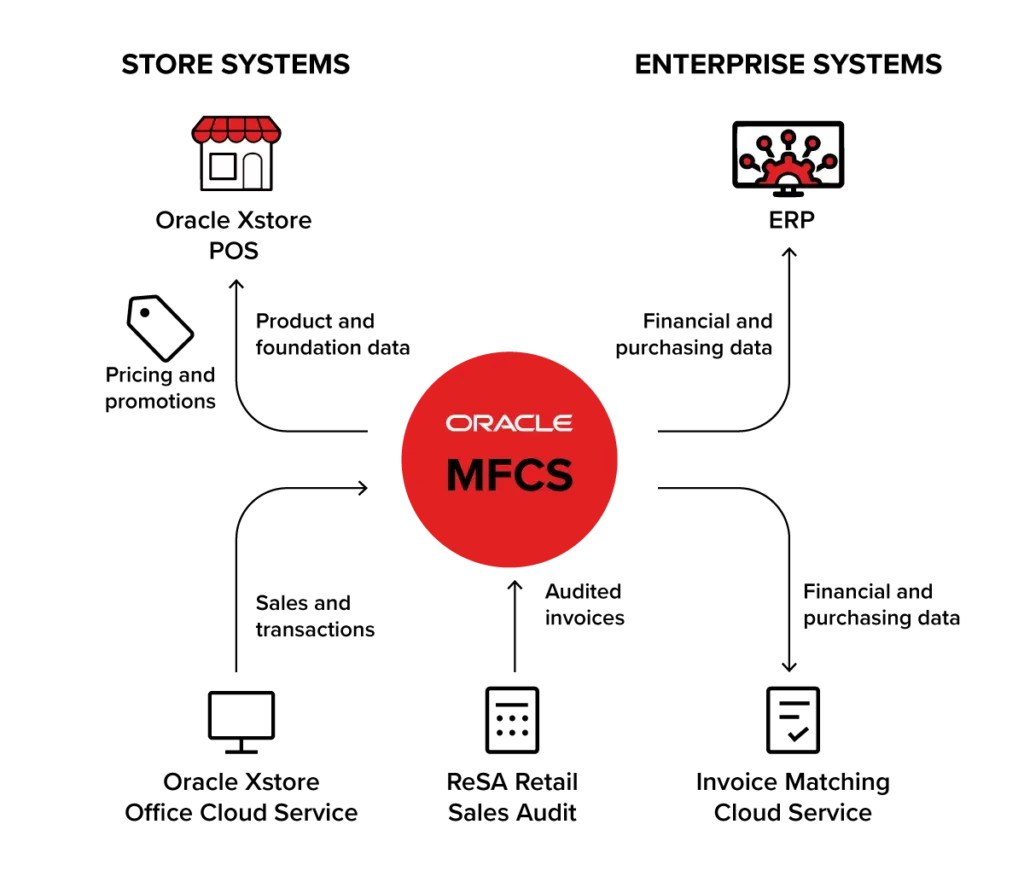
Supporting Omnichannel with POS & ERP Integration
Real-time integration between ORMCS, POS, and ERP systems is foundational to delivering seamless omnichannel experiences:
- BOPIS (Buy Online, Pick Up In Store): Live inventory visibility powered by ORMCS and POS ensures accurate availability across digital and physical channels.
- Endless Aisle: Enable store associates to sell out-of-stock or online-only items by accessing inventory from other locations or channels.
- Gift Cards: Issue and redeem gift cards across eCommerce, POS, and customer service touchpoints with full balance synchronization.
- AI Store Assistant: Guide shoppers with real-time product availability and offers.
Conclusion: Ready to Unlock Unified Retail Operations?
Oracle Retail Merchandising Cloud Services is a powerful platform, but its true potential is only realized when connected to your POS and ERP systems.
With SkillNet Solutions, you gain a trusted partner with deep retail expertise and proven accelerators to help you unify operations, modernize technology, and support omnichannel growth. From StoreHub to Commerce DevOps Accelerators, we simplify complexity so your teams can move faster and with confidence.
Let’s transform disconnected systems into a unified, agile retail platform, built for today, and ready for tomorrow.
For more information about our merchandising services, please check out the links below:


